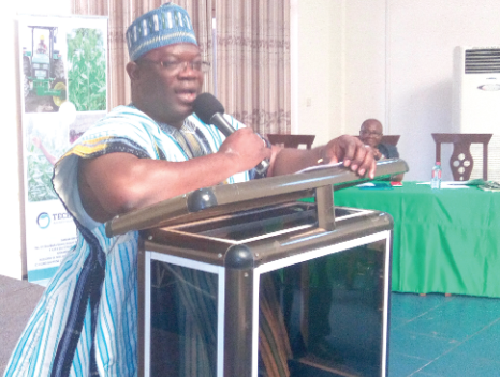
TechnoServe to revive fortunes of agric sector
For decades, Ghana’s agricultural sector has suffered low investments, minimal technological infusion and general neglect, resulting in marginal growth and contribution to national output. From 30.4 per cent in 2006, the sector’s contribution to total economic output, measured by gross domestic product (GDP), has declined to 20.2 per cent in 2015.
The drop in the sector’s contribution to GDP can be traced to the steady reduction in its growth rates over the years.
After ending 2008 at 7.4 per cent, growth in agriculture resumed a downward trend; dropping to 5.3 per cent in 2010 before peaking at 5.7 per cent in 2013.
Last year, growth in the sector dropped from 4.6 per cent in 2014 to 2.5 per cent, raising questions over the impact of various interventions aimed at lifting it.
To help reverse the trend, various institutions and stakeholders have come out with a number of initiatives that are aimed at inspiring farmers and businesses along the value chain to increase output.
One of those is TechnoServe Ghana’s dialogue on agricultural mechanisation. Organised in Tamale in collaboration with the Ministry of Food and Agriculture (MoFA), the one day dialogue on mechanisation was aimed at ensuring that farmers in the country got easy access to various modern agricultural machinery to improve productivity.

Stakeholders
The meeting brought together stakeholders from the academia, investor community, policymakers and farmers across the country to deliberate on how improved methods can help lift the farming business from its quagmire.
It was on the theme: ‘Developing a Home Grown Sustainable Model for Agriculture Mechanisation along the Value Chain.’
Challenges
Recounting the challenges facing the agricultural sector, the Deputy Country Director of TechnoServe Ghana, Mr Samuel Baba Adongo, said over the years, the sector had been characterised by low productivity and low technology adoption.
“As a result, communities in northern Ghana are stuck in a cycle of subsistence farming and for many households, low agricultural growth means poverty and malnutrition,” he said.
He mentioned lack of access to agricultural technology, markets, poor infrastructure and a short farming season as some of the challenges impeding the growth of the agricultural sector.
These challenges, he said, had resulted in reduced yield in the sector despite the ongoing interventions in the form of subsidies and development aid.

Highlighting mechanisation
Recently, efforts aimed at raising the agricultural sector has centered on ensuring easy access to high, quality seeds and fertiliser with less focus placed on mechanisation.
Although, resilient seeds and fertile soil are essential to higher yields and improved quality, increasing globalisation means that less attention is now paid to old ways of farming which Ghanaian farmers are still attached to.
This is disingenuous to the sector. For instance, a 2012 field survey found that it took about 30 hours for a farmer using only a hand hoe to prepare one hectare of land for planting.
According to the survey, the service charge for land preparation per hectare was US$5.67 for people using draught animals and US$6.47-US$7.09 for those using hand and tractor respectively.
Beyond the cost element, the time required preparing land through manual and draught animal practices placed farmers at a risk of missing the planting windows.
Timeliness of operations, quality of tillage, appropriate spacing and depth of seed placement and reduced post-harvest losses are benefits of mechanisation that should not be overlooked.
Technology alternative, specifically mechanised production, using tractors and appropriate implements, are necessary to increase productivity and yield beyond the level that inputs alone are able to achieve.
The projections of food demand and other factors that promise to disrupt current farming production such as population growth and climate change – necessitate more advanced agronomics to achieve yield increases that meet future demand.
Providing farm equipment
The Director General of John Deere West Africa, Mr Cobus Du Toit, stated that for farmers to earn a living from agricultural, farmers should be allowed to depend solely on hand tool technologies but be encouraged to engage in sustainable agriculture mechanisation.
That, he said, would help increase agricultural productivity and the amount they earned from the business.
Mr Toit indicated that John Deere, a leading dealer in farming machinery in Africa, had introduced several new agricultural machines onto the Ghanaian market, which when patronised, could help raise output.
Government’s commitment
For his part, the Minster of Food and Agriculture, Mr Armed Muniru-Limuna, said the government was committed to mitigating the challenges facing the agricultural sector through the implementation of various projects.
He mentioned the Ghana Incentive-Based Risk-Sharing System for Agricultural Lending (GIRSAL) and Farmers Service Center Projects as some of the projects the government was using to achieve its agenda.
“GIRSAL will mitigate the risks associated with agricultural projection through its six pillars of risk sharing, insurance, digital finance, bank rating, bank incentive and technical assistance,” he said.